Carbon-based Polymer Nanocomposites for Environmental and Energy Applications
Coordonnateurs : Ismail Ahmad Fauzi, Goh Pei Sean

Carbon-Based Polymer Nanocomposites for Environmental and Energy Applications provides the fundamental physico-chemical characterizations of recently explored carbon-based polymer nanocomposites, such as carbon nanotubes, graphene and its derivatives, nanodiamond, fullerenes and other nano-sized carbon allotropes. The book also covers the applications of carbon-based polymer nanocomposite in the environmental and energy fields. Topics range from the various approaches that have been explored and developed for the fabrication of carbon-based polymer nanocomposite, to their applications in tackling environmental and energy related issues.
Part 1: Carbon-based Polymer Nanocomposites 1. Surface modification of carbon-based nanomaterials for polymer nanocomposite 2. Conventional and advanced techniques for the fabrication of carbon-based polymer nanocomposite 3. Characterizations of carbon-based polymer nanocomposite 4. Physical and chemical properties of carbon-based polymer nanocomposite-Computational studies 5. Physical and chemical properties of carbon-based polymer nanocomposite-Experimental studies
Part 2: Environmental applications of Carbon-based Polymer Nanocomposite 6. Carbon-based polymer nanocomposite as adsorbent for heavy metal removal 7. Carbon-based polymer nanocomposite as antimicrobial agent 8. Carbon-based Polymer Nanocomposite membrane for acidic gas removal 9. Carbon-based Polymer Nanocomposite membrane for oily wastewater treatment 10. Carbon-based Polymer Nanocomposite membrane for inorganics, fertilizers and nutrients containing wastewater treatment 11. Carbon-based Polymer Nanocomposite membrane for desalination 12. Carbon-based Polymer Nanocomposite for dyes and pigments removal 13. Carbon-based Polymer Nanocomposite for photodegradation of organic hazardous materials 14. Carbon-based Polymer Nanocomposite for sensing 15. Carbon-based Polymer Nanocomposite as electrodes for microbial fuel cell
Part 3: Energy applications of Carbon-based Polymer Nanocomposites 16. Carbon-based Polymer Nanocomposite membrane for proton exchange membrane fuel cell 17. Carbon-based Polymer Nanocomposite as electrolytes 18. Carbon-based Polymer Nanocomposite for solar cell 19. Carbon-based Polymer Nanocomposite for photovoltaic devices 20. Carbon-based Polymer Nanocomposite as energy saving devices 21. Carbon-based Polymer Nanocomposite for supercapacitors 22. Carbon-based Polymer Nanocomposite for lithium ion batteries 23. Carbon-based Polymer Nanocomposite for gas storage
(Post)-graduate students, researchers in academia and industry working in chemical engineering and materials science
Prof. Dr. Ahmad Fauzi Ismail is the Founder and First Director of Advanced Membrane Technology Research Centre (AMTEC). His research interest are in development of polymeric, inorganic and novel mixed matrix membranes for water desalination, waste water treatment, gas separation processes, membrane for palm oil refining, photocatalytic membrane for removal of emerging contaminants, development of haemodialysis membrane and polymer electrolyte membrane for fuel cell applications. His research has been published in many high impact factor journals. He also actively authored many academic books in this field which published by reputable international publishers. He is the author and co-author of over 600 refereed journals. He has authored 6 books, over 50 book chapters and 4 edited books, 6 Patents granted, 14 Patents pending. His h-index is 66 with cumulative citation of over 19,300. He won more than 150 awards national and internationally. Among the most prestigious award won is the Merdeka Award for the Outstanding
- Provides a clear picture of the current state-of-the-art and future trends in carbon-based polymer nanomaterials
- Explains the interactions between nanofiller-polymer matrices and mechanisms related to applications in environmental pollution and energy shortage
- Includes computational and experimental studies of the physical and chemical properties of carbon-based polymer nanocomposites
- Features chapters written by world leading experts
Date de parution : 03-2018
Ouvrage de 632 p.
19x23.3 cm
Thèmes de Carbon-based Polymer Nanocomposites for Environmental... :
Mots-clés :
Acidic gas separation; Alignment; Anode; Arbon nanotube; Biofilm formation; Biosensors; Carbon; Carbon fibers; Carbon molecular sieve; Carbon nanofillers; Carbon nanomaterials; Carbon nanostructures; Carbon nanotube; Carbon nanotubes; Carbon-based electrodes; Carbon-based materials; Carbon-based membrane; Carbon-based nanocomposites; Carbon-based nanomaterials; Carbon-based polymer; Cathode; Click chemistry; Composite membranes; Computational; Covalent functionalization; DMFC; Desalination; Dyes; Electric field; Electrical conductivity; Electrical double-layer capacitance; Electrical properties; Electrochemical devices; Electron transport; Electronic properties; Electrostatic interaction; Experimental; Fabrication; Fouling; Functionalization; Functionalized carbonaceous fillers; Gas sensors; Graphene; Graphene applications; Graphene nanoplatelets; Graphene properties; Graphene-based material; Graphene/polymer nanocomposite fibers; Heavy metal; Hybrid nanocomposites; Hydrophilicity; Hydrophobicity; Inorganic; Interfacial polymerization; Lithium-ion battery; Magnetic field; Mechanical properties; Membrane; Microbial fuel cell; Microhardness; Modification; Nanocomposite; Nanocomposite membrane; Nanocomposites; Nanoindentation; Nanomaterials; Nanoscale fillers; Noncovalent functionalization; Oil rejection; Oily wastewater; Oxygen reduction reaction; PEMFC; Percolation; Phase inversion; Photovoltaic; Pigments; Polyaniline; Polymer; Polymer matrix; Polymer nanocomposites; Polymer nanocomposites (PNCs); Polymeric membranes; Polypropylene; Processing; Proton conductivity; Proton exchange membrane fuel cell; Pseudocapacitance; Sensors; Strain sensors; Supercapacitor; Supercapacitor application; Supercapacitors; Synergy; Thermal analysis; Ultrafiltration; Water flux; π-π interaction



